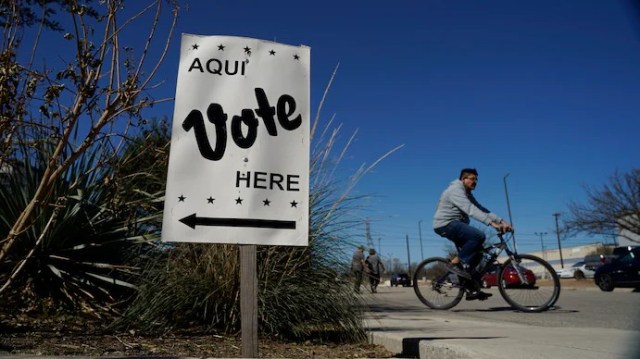
The Republican Party is entrusting a big portion of its political future in 2022 and beyond on a wave of Hispanic candidates in several key races. This is good news for Latino political representation, which has lagged far behind other constituencies. But electoral ambitions come with a considerable measure of responsibility, especially for candidates who have emigrated to the United States.
By Washington Post – León Krauze
Aug 9, 2022
Recently, I got a chance to interview Carmen María Montiel on Al Punto, Univision’s Sunday morning talk show. Born in Venezuela, Montiel emigrated to the United States three decades ago and is now running for Congress in Texas’s 18th District. Her bid is a longshot: Rep. Sheila Jackson Lee (D-Tex.) has held the seat in the traditionally Democratic Houston district since the mid-90s. But Montiel is a solid example of the kind of Latino candidates the GOP has recruited recently.
What drew me to interview Montiel was trying to get a deeper understanding of how Republicans have been gaining ground with Hispanics in Texas, and across the country. Montiel said it was because of shared values. “Faith and family are very important to us,” she said. She said the way to prevent tragedies like the death of 53 people inside a trailer truck in San Antonio is to “close the border down and have people enter legally.” I asked her if, after Uvalde, she favored more gun control. “We don’t need new laws,” she replied. “We need to enforce those we already have.”
Nothing new there – these are standard conservative views.
But then I asked Montiel about the 2020 election. I wanted to know if she thought President Biden was the legitimate winner. Her answer puzzled me. “Given my experience in Venezuela and what has happened over the last twenty years, I find the moment they stopped counting to be a big question mark,” she told me. “That’s how they do it in Venezuela: they stop counting and then everything changes. That night, Trump was ahead and then everything changed.” I followed up on Biden’s legitimacy. “I question it,” she said.
The exchange illustrates a familiar challenge for Republican candidates in 2022: whether to acknowledge Biden’s victory or endorse Trump’s unproven claims of electoral fraud. Many candidates have chosen to validate Trump’s falsehoods to win support among Republican voters.
But for candidates like Montiel, whose roots are Latin American, there should be no equivocation. Montiel’s unfounded claim that Venezuela’s electoral system resembles the United States’ could come from a genuine concern for U.S. democracy. She said she had decided to run to prevent the United States from following the same path of decay Venezuela has endured under Hugo Chávez and Nicolás Maduro. “I’ve already lost a country,” she said. “I refuse to lose another one.”
But that makes Montiel’s inferences more unacceptable.
There is no comparison between the U.S. electoral system and Venezuela’s blatantly illiberal process. Elections in Venezuela are neither free nor fair. The catalogue of electoral misconduct is long. “Authoritarian tactics all but quashed political pluralism and ensured the elections would not reflect the will of the Venezuelan people,” said Secretary of State Antony Blinken after the country’s 2021 election. This could be an understatement. Maduro, the country’s autocratic ruler, has barred opponents from running and has put in place an electoral authority whose sole aim is to favor him.
By sowing doubt over the 2020 vote count – with an association with Venezuela, no less – Montiel might be unwittingly abetting in the destruction of the same American democratic institutions she insists she holds dear.
Just last month, a group of Republican staffers and officials released a 70-page report carefully examining the lawsuits and audits triggered by the former president in the wake of the 2020 election. “We conclude that Donald Trump and his supporters had their day in court and failed to produce substantive evidence to make their case,” the report concluded. “Even now, twenty months after the election, a period in which Trump’s supporters have been energetically scouring every nook and cranny for proof that the election was stolen, they come up empty,” the report notes.
This is why is so concerning to hear candidates such as Montiel repeat baseless conspiracy theories for political gain. Public figures who understand real, demonstrable electoral fraud in Latin América have the responsibility to add context and restraint to U.S. political debate. To nurture toxic and divisive conspiracy theories is, after all, the most certain way to lose a country.
…
Read More: Washington Post – Opinion – A Texas candidate’s claims equating the U.S. and Venezuela are alarming
…

